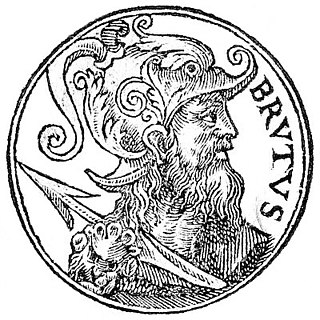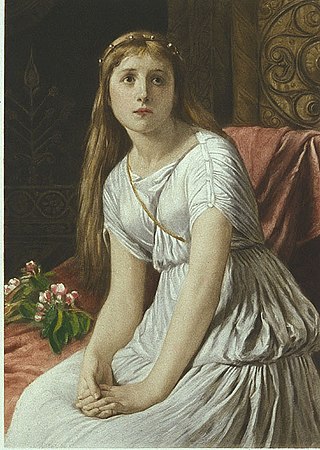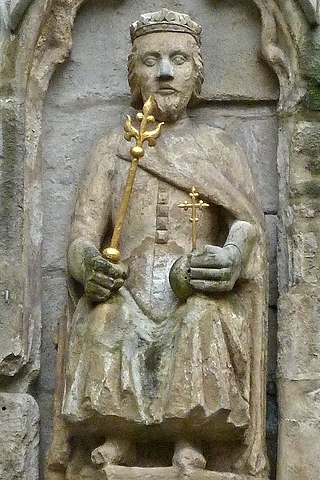Related Research Articles

Ambrosius Aurelianus was a war leader of the Romano-British who won an important battle against the Anglo-Saxons in the 5th century, according to Gildas. He also appeared independently in the legends of the Britons, beginning with the 9th-century Historia Brittonum. Eventually, he was transformed by Geoffrey of Monmouth into the uncle of King Arthur, the brother of Arthur's father Uther Pendragon, as a ruler who precedes and predeceases them both. He also appears as a young prophet who meets the tyrant Vortigern; in this guise, he was later transformed into the wizard Merlin.

Brutus, also called Brute of Troy, is a legendary descendant of the Trojan hero Aeneas, known in medieval British legend as the eponymous founder and first king of Britain. This legend first appears in the Historia Brittonum, an anonymous 9th-century historical compilation to which commentary was added by Nennius, but is best known from the account given by the 12th-century chronicler Geoffrey of Monmouth in his Historia Regum Britanniae.

Coel, also called Coel Hen and King Cole, is a figure prominent in Welsh literature and legend since the Middle Ages. Early Welsh tradition knew of a Coel Hen, a c. 4th-century leader in Roman or Sub-Roman Britain and the progenitor of several kingly lines in Yr Hen Ogledd, a region of the Brittonic-speaking area of what is now northern England and southern Scotland.

King Lot, also spelled Loth or Lott, is a British monarch in Arthurian legend descended from Humber's Huns. He was introduced in Geoffrey of Monmouth's chronicle Historia Regum Britanniae as King Arthur's brother-in-law, who serves as regent of Britain between the reigns of Uther Pendragon and Arthur. He has appeared regularly in works of chivalric romance, alternating between the roles of Arthur's enemy and ally, and is often depicted as the ruler of Lothian and either Norway or Orkney. His literary character is likely derived from hagiographical material concerning Saint Kentigern, which features Leudonus as king of Leudonia and father of Saint Teneu.

Locrinus was a legendary king of the Britons, as recounted by the 12th-century chronicler Geoffrey of Monmouth in his Historia Regum Britanniae. He came to power in 1125BC.

Leir was a legendary king of the Britons whose story was recounted by Geoffrey of Monmouth in his pseudohistorical 12th-century History of the Kings of Britain. According to Geoffrey's genealogy of the British dynasty, Leir's reign would have occurred around the 8th century BC, around the time of the founding of Rome. The story was modified and retold by William Shakespeare in his Jacobean tragedy King Lear.

Cordelia was a legendary Queen of the Britons, as recounted by Geoffrey of Monmouth. She came to power in 855BC.
Marganus was a legendary king of the Britons as accounted by Geoffrey of Monmouth. He came to power in 850BC.

Belinus the Great was a legendary king of the Britons, as recounted by Geoffrey of Monmouth. He was the son of Dunvallo Molmutius and brother of Brennius and came to power in 390BC. He was probably named after the ancient god Belenus.

Brennius was a legendary king of Northumberland and Allobroges, as recounted by Geoffrey of Monmouth. He was the son of Dunvallo Molmutius and brother of Belinus, probably based upon one or both of the historical Brenni. He came to power in 390BC.
Ingenius is a legendary king of the Britons as recounted by Geoffrey of Monmouth's pseudohistorical work Historia Regum Britanniae, written c. 1138 CE. Ingenius was the fourth son of King Morvidus and the brother of Gorbonianus, Archgallo, Elidurus, and Peredurus. He came to power in 317BC.
The son of Gorbonianus was a legendary king of the Britons as recounted by Geoffrey of Monmouth. He was a son of King Gorbonianus but was never given a name in the text. He came to power in 305BC.
Gerennus was a legendary king of the Britons as recounted by Geoffrey of Monmouth. He came to power in 275BC.

Historia regum Britanniae, originally called De gestis Britonum, is a pseudohistorical account of British history, written around 1136 by Geoffrey of Monmouth. It chronicles the lives of the kings of the Britons over the course of two thousand years, beginning with the Trojans founding the British nation and continuing until the Anglo-Saxons assumed control of much of Britain around the 7th century. It is one of the central pieces of the Matter of Britain.

King Arthur is a 2004 historical adventure film directed by Antoine Fuqua and written by David Franzoni. It features an ensemble cast with Clive Owen as the title character, Ioan Gruffudd as Lancelot and Keira Knightley as Guinevere, along with Mads Mikkelsen, Joel Edgerton, Hugh Dancy, Ray Winstone, Ray Stevenson, Stephen Dillane, Stellan Skarsgård and Til Schweiger.
Arvirargus or Arviragus was a legendary British king of the 1st century AD, possibly based upon a real person. A shadowy historical Arviragus is known only from a cryptic reference in a satirical poem by Juvenal, in which a giant turbot presented to the Roman emperor Domitian is said to be an omen that "you will capture some king, or Arviragus will fall from his British chariot-pole".
Coilus was a legendary king of the Britons during the time of the Roman occupation of Britain as recounted in Geoffrey of Monmouth's pseudohistorical Historia Regum Britanniae. He came to power in 142AD.

Dionotus was a legendary king of Cornwall in Geoffrey of Monmouth's Historia regum Britanniae, an account of the rulers of Britain based on ancient Welsh sources and disputed by many historians. Dionotus succeeding his brother Caradocus, and was regent of Britain during the campaigns in Gaul of Emperor Magnus Maximus. The curious thing about this king is that the Welsh chronicles, which parallel most of Geoffrey of Monmouth's book, do not mention this king by name. However, Geoffrey uses Latin versions of Welsh names so he could be referring to Dynod, duke of Cornwall, or Anwn Dynod, Maximus's own son.
Gracianus Municeps was a legendary King of the Britons, according to Geoffrey of Monmouth's Historia regum Britanniae, a largely fictional account of British history. "Municeps" translates to "freedman", meaning this individual was Gracianus the freedman. After the death of Roman Emperor Magnus Maximus, Gracianus seized the throne of Britain upon receiving word of Maximus's demise, by whose orders he had been sent to defend the attacked island while Maximus was campaigning on the continent.
Peredurus is a legendary king of the Britons in Geoffrey of Monmouth's pseudohistorical chronicle Historia Regum Britanniae. According to Geoffrey, he was the youngest son of King Morvidus and brother of Gorbonianus, Archgallo, Elidurus, and Ingenius.
References
- ↑ Monarchie Nobelesse website, Bretons
- 1 2 Sacred Texts website Histories of the Kings of Britain (Book IV), by Geoffry of Monmouth, tr. by Sebastian Evans (1904)